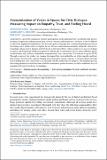Anonymization of Voices in Spaces for Civic Dialogue: Measuring Impact on Empathy, Trust, and Feeling Heard
Author(s)
Kang, Wonjune; Hughes, Margaret; Roy, Deb
Download3687021.pdf (1.757Mb)
Publisher Policy
Publisher Policy
Article is made available in accordance with the publisher's policy and may be subject to US copyright law. Please refer to the publisher's site for terms of use.
Terms of use
Metadata
Show full item recordAbstract
Anonymity is a powerful component of many participatory media platforms that can afford people greater freedom of expression and protection from external coercion and interference. However, it can be difficult to effectively implement on platforms that leverage spoken language due to distinct biomarkers present in the human voice. In this work, we explore the use of voice anonymization methods within the context of a technology-enhanced civic dialogue network based in the United States, whose purpose is to increase feelings of agency and being heard within civic processes. Specifically, we investigate the use of two different speech transformation and synthesis methods for anonymization: voice conversion (VC) and text-to-speech (TTS). Through a series of two studies, we examine the impact that each method has on 1) the empathy and trust that listeners feel towards a person sharing a personal story, and 2) a speaker's own perception of being heard, finding that voice conversion is an especially suitable method for our purposes. Our findings open up interesting potential research directions related to anonymous spoken discourse, as well as additional ways of engaging with voice-based civic technologies.
Date issued
2024-11-08Department
Program in Media Arts and Sciences (Massachusetts Institute of Technology)Journal
Proceedings of the ACM on Human-Computer Interaction
Publisher
ACM
Citation
Kang, Wonjune, Hughes, Margaret and Roy, Deb. 2024. "Anonymization of Voices in Spaces for Civic Dialogue: Measuring Impact on Empathy, Trust, and Feeling Heard." Proceedings of the ACM on Human-Computer Interaction, 8 (CSCW2).
Version: Final published version
ISSN
2573-0142